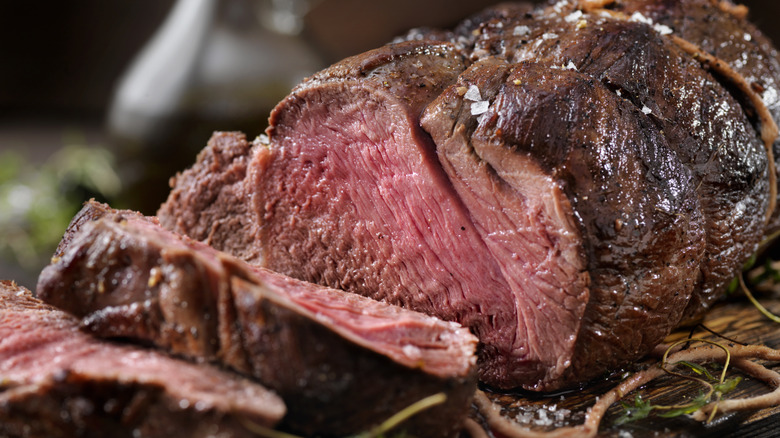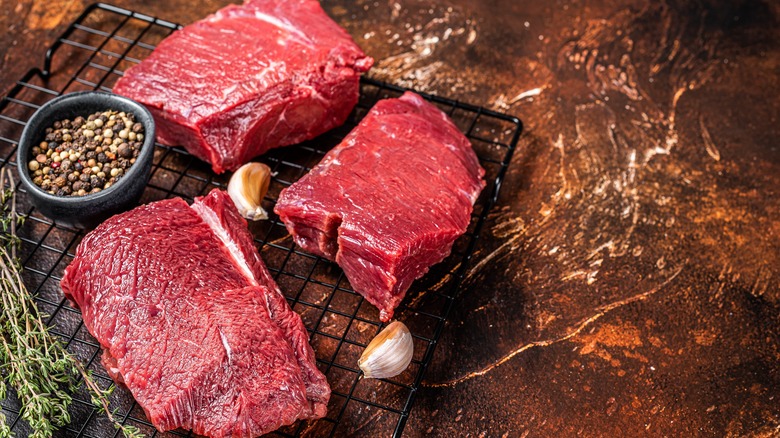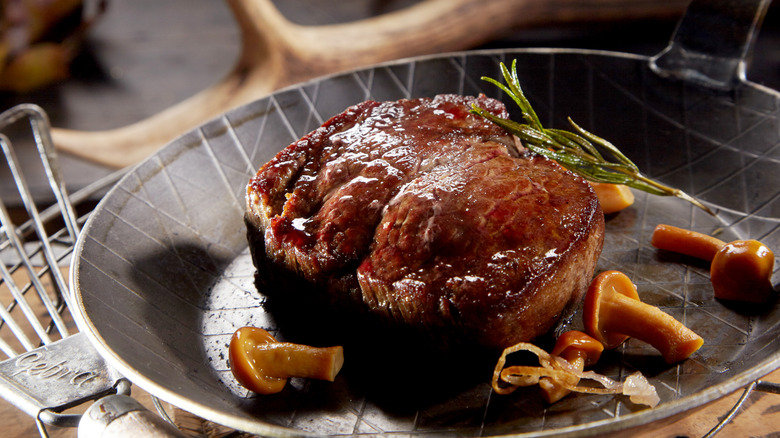Soak Your Venison In Milk To Avoid That Gamey Taste
If you grew up eating meat solely from farm-raised animals like cows or pigs, chances are you might find the taste of venison and other wild game meats like boar, or elk, a bit on the gamey side. Wild game meat usually has a stronger taste than conventional beef or pork because the animals are more active in the wild, and therefore leaner. If you're not into the gamey taste of wild venison, what might be turning you off is the higher iron content, which can taste metallic. You can get rid of the gamey, metallic taste in your venison with a few simple steps and ingredients.
Before you cook your venison, place it in a resealable bag or container and submerse it in whole milk. Let it sit in the refrigerator for at least four hours, and no more than 12, before proceeding to cook it as you normally would. The calcium in milk contains enzymes that will tenderize the meat, and the main protein in milk will neutralize the gamey flavor. It won't be so un-gamey that it tastes like beef, but it's likely enough for those who prefer to avoid the taste. Milk is best (but nothing less than full-fat) because it will do the same job as more acidic liquids like vinegar or lemon juice, but won't leave the meat mushy.
If you want an extra punch of acidity you can use cultured dairy like buttermilk or yogurt in place of whole milk. Turn it into a marinade by seasoning the milk or yogurt with aromatics, herbs, and of course, salt.
Soak your venison in a salty solution first
To help reduce the gamey taste even more, before marinating your venison in milk, you can also soak your meat in a salty, brine solution. This is often how other meats are flavored and tenderized, but for gamey venison, it works in a few ways. A saltwater soak will help draw out blood, which can make the venison taste gamey. The sodium and chloride in salt water will also break down some of the molecules that contribute to the gamey taste. Lastly, the salt will strengthen other flavors in the dish, making it more palatable by masking some of the gamey flavor of the meat.
It's recommended to use 1 tablespoon of salt for every quart of cold water for your brine. Let everything sit in the fridge overnight to work its magic. After the soak, rinse the meat in cold water thoroughly, and discard the brine right away. You can then move on to soaking the venison in milk or marinating the meat if you prefer, but watch the salt, as the salt soak will have already added a considerable amount.
Preparing and cooking venison steaks isn't that different from other meat
Cooking game meat isn't far off from cooking any other kind of meat, but you do have to be aware of how quickly wild game can overcook. The meat is much leaner than other meats, so you should treat every piece as if you're cooking a tender steak. Cuts like chops and steaks should be cooked quickly over high heat –- not unlike beef –- but take care that the grill doesn't exceed 375 degrees Fahrenheit, as the leaner meat will shrink and become tough and dry. Steaks from venison should be cooked to an internal temperature of 145 degrees Fahrenheit, according to the USDA, for a medium doneness.
Gamey meat doesn't have to be a bad thing. Sure, if you grew up eating wild meat you most likely don't mind the gamey taste. But a dish being described as gamey shouldn't be viewed as a negative. After all, if you're going to eat deer, rabbit, or any other kind of wild game, it should taste a bit gamey, otherwise, you might as well be eating regular old pork or turkey. If you're still wary of the inherent gaminess of wild meat, even more can be done to reduce the flavor to something more palatable. Besides soaking or marinating, trimming off any fat, sinew, and silverskin will remove some of the strong flavors, as this is where a lot of the gamey taste comes from.


